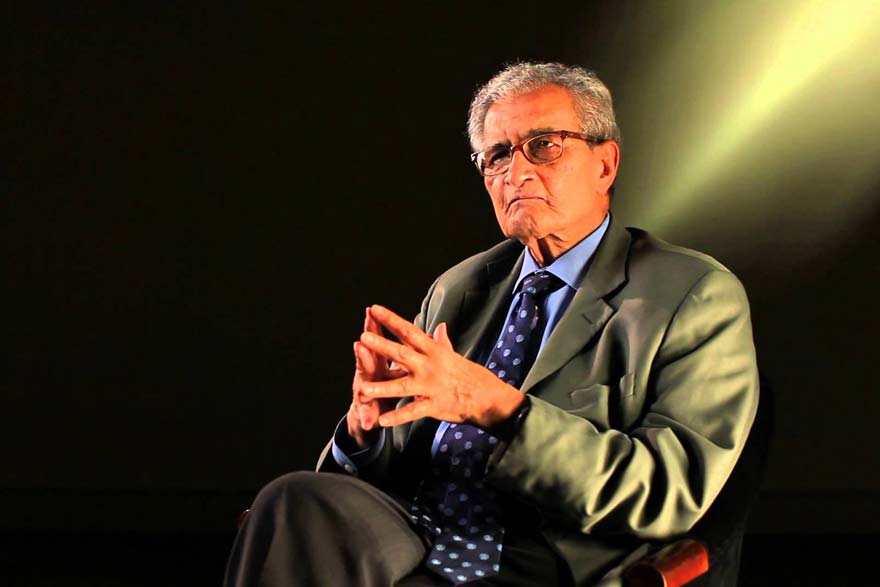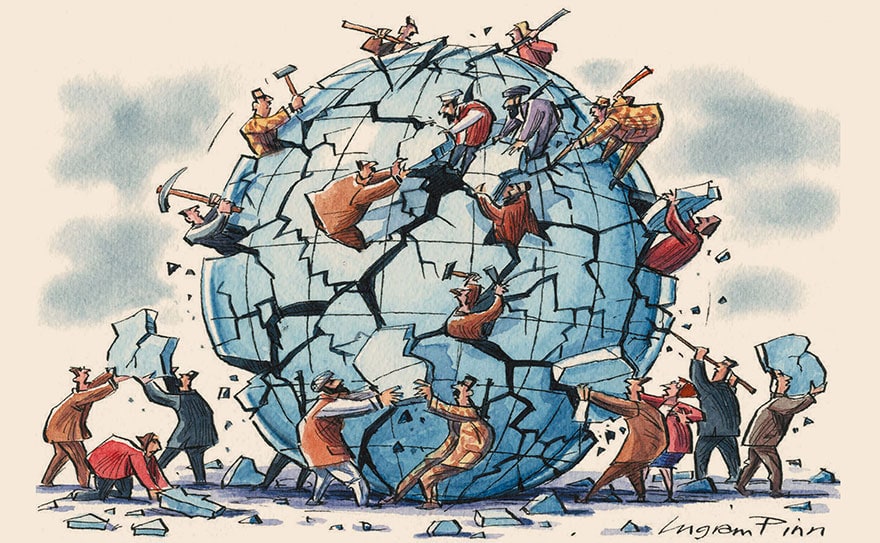Amartya Sen, the Indian economist and philosopher Amartya Sen, sometimes referred to as the "Nobel of the poor" [1], is today one of the most influential intellectuals in the world. His writings are recognized for their major contribution to the analysis of inequalities and reflections on justice. Deeply affected by the famine in Bengal in 1943, he directed his research towards questions of inequality, poverty and ethics in economics. He also carried out a long reflection on the measurement of the level of development of countries [2]. He stands out from other thinkers "Liberal-egalitarian"The Committee of the Regions, in particular John Rawls, considering, on the one hand, that social justice is less a matter of principles and rules and ideal procedures for achieving a reduction in inequalities than of a concrete and pragmatic approach to combating inequalities and, on the other hand, that the granting of formal rights is completely insufficient to ensure social justice, which requires the taking into account of the "capabilities" [3] individuals.
The purpose of this article is to present this social justice thinker's approach and positioning in relation to the Basic Income, and to show how he can justify it.
A less idealized than pragmatic approach to social justice...
In a book published in 2010, "The Idea of Justice [4]", Amartya Sen synthesizes five decades of work and reflection. He expresses his appreciation of justice issues by telling the following little parable:
"Let's imagine three children and a flute. Anne says the flute is hers because she is the only one who can play it; Bob because he is so poor that he has no toys; Carla because she spent months making it. How do you decide between these three claims, which are all equally legitimate?
In his view, no institution, no procedure can help us to resolve this dispute in a way that would be universally accepted as fair. Indeed, depending on which dimension of justice is favoured, each of the three children can get the flute. The utilitarians would give it to Anne, the egalitarians to Bob, and the libertarians to Clara. To solve the problem, one must not only take into account the particular circumstances, but also involve moral and political preferences.
Amartya Sen thus departs resolutely and definitively from the theories of justice that seek to define the rules and principles that govern just institutions in an ideal world. in the tradition of Hobbes, Rousseau, Locke and Kant, and, in this day and age, the leading thinker in political philosophy, John Rawls. Sen is part of another tradition of the Enlightenment, carried by Smith, Condorcet, Bentham, Marx and Mill: that which compares different social situations in order to combat real injustices.
In an interview with the newspaper Le Point [5], Amartya Sen states that, although he considers Rawls to be "the greatest contemporary theorist of justice."he disagrees with her approach. In seeking to define the philosophical foundations of a perfectly just society, Rawls' answer focuses on institutions, whereas Sen believes that, while we need good institutions, we do not need them. "when people are mistreated, we can improve their lot without necessarily changing the institutions.".
Sen also criticizes Rawls for thinking about how to achieve justice on the basis of primary social goods, without thinking about the use that individuals can make of them, thus failing to achieve a minimum equalization of resources in order to live equitably in a liberal society.
...that goes beyond the principles of justice and the mere distribution of resources...
Thus, Sen considers that what is necessary to equalize is not goods as such, but rather capabilities, which are the basic capacities that enable individuals to function in a certain way in the democratic space and thus give an effective content to their freedom.
According to him, there is a need to equalize the "capacity" of people to choose and combine different actions to achieve their projects. From this perspective, the redistribution of resources is only one means among others. It is therefore important for social justice to choose policies that expand the possibilities for action, in other words, the freedom of all people.
But the idea that poverty is a deprivation of freedom is not self-evident. It can be understood by comparing, as he does, the situation of two people: one fasting and one malnourished. From the point of view of resources and ill-being, the two find themselves in the same situation. But what makes the difference is that one chose not to eat and the other had no choice. Amartya Sen's idea is therefore that comparing the possibilities for action available to individuals, their capabilitiesA better way to understand inequalities than to compare their level of resources or satisfaction is to compare their level of resources or satisfaction.
Unlike most thinkers of the "liberal-egalitarian" family, Amartya Sen, refuses on principle to ask and answer the question "What is a just society? ».
"As a result, it cannot, a priori, pronounce on whether the Basic Income would be part of a just social arrangement. But he considers that the introduction of a Basic Income could make a society more just. The system of measurement he proposes is that of basic capabilities, such as access to adequate food, housing, clothing, health and education. If, in given circumstances, the introduction of a Basic Income could extend some of these capabilities in a sustainable way to a larger part of the population, his vision of justice would support it. But there may be circumstances in which, by choice, another policy, such as a guarantee of employment, would be preferable to a Basic Income" (ibid.). [6].
... and which makes Amartya Sen an influential advocate of a Basic Income that his capability approach could justify.
Amartya Sen, spoke about the Basic Income in an interview with an Indian television station [7]. Asked whether India should introduce a universal Basic Income, Sen responded quite critically, arguing that a Basic Income is not the best way to fight poverty today. in IndiaThis is particularly true in the case of the United States, where funding for health care, education and other public services is inadequate. It argues that it is not enough to "giving money to people" and that it would be a "abdication of responsibility" from the government if it gave money to individuals rather than providing better public services.
However, he added that, as far as India was concerned, it would be different on the subject of the basic income if his country had reached the level of prosperity experienced in Europe. And he says, "If that were the case, I think Basic Income would be a good thing," and then he goes on to say, "but I don't think [for India] we're there yet at all. «
Amartya Sen also spoke on the subject of Basic Income, on the occasion of the publication in 2017 of the book by Philippe Van Parijs and Yannick Vanderborght, Basic Income, by writing on the 4th of couverture : " In this important introduction to the Basic Income initiative - an economic proposal that can radically transform the nature of the modern economy and society - two leading social scientists examine the ethics and economics of the proposal. This is essential for anyone interested in the problems of deprivation and lack of freedom experienced even in the richest countries of the world. The corrective reasoning presented by Van Parijs and Vanderborght is powerful as well as very engaging - a brilliant book. "
Thus, certainly provided that the country concerned has reached a certain level of economic development, there is no doubt that Amartya Sen, an immense intellectual, is in favour of a basic income which, in this case, could be justified by his approach of capabilities.
Robert Cauneau, a member of the Mouvement Français pour un Revenu de Base (MFRB)
The ideas expressed in this article do not express an opinion of the MFRB and are the sole responsibility of the author.
1] Amartya Sen was awarded the Nobel Prize in Economics in 1998.
2] Amartya Sen inspired the Human Development Index (HDI) which has been used since 1990 by the United Nations Programme (UNDP). For Sen, as for the UNDP, development is, in the final analysis, a process of enlarging people's choices rather than a simple increase in national income. The indicator previously used, GDP per capita, did not provide information on individual or collective well-being, assessing only economic output.
3] It is about the possibility for individuals to make choices among the goods they consider valuable and to actually attain them.
[4] A. Sen, The Idea of Justice, Flammarion, 2010
5] Interview granted on January 14, 2010: http://www.lepoint.fr/actualites-chroniques/2010-01-14/amartya-sen-et-la-parabole-de-la-flute/989/0/413630
[6] P. Van Parijs and Y. Vanderborght, Basic Income, Harvard University Press, 2017, p117












